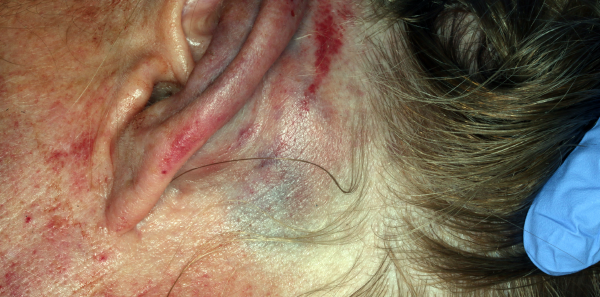
The Case
A 24-year-old woman is brought to the emergency department via EMS. She was found by police after a 911 call from her neighbor, who heard shouting. The patient states that she was assaulted by her boyfriend. She does not recall all the details, but she says that she was kicked in the side of the head (see Figure 1). On further questioning, she discloses that she was also strangled and that she lost consciousness at least once during the assault (see Figure 2).
Explore This Issue
ACEP Now: Vol 39 – No 03 – March 2020TBI in the Setting of Intimate Partner Violence
Roughly one in three women will experience intimate partner violence (IPV) at some point during their lives.1 While IPV is often associated with traumatic brain injury (TBI), TBI often goes unrecognized and undiagnosed among its victims. Various studies have found the prevalence of TBI in this population to range between 30 and 75 percent. If true, more TBIs are caused by IPV than by sport-related head injuries.2–4 Even mild TBI may cause chronic disability without appropriate rehabilitation. Therefore, emergency physicians are in a unique position to prevent long-term sequelae by diagnosing TBI and providing appropriate referrals.
There is a lack of research regarding TBI in the context of IPV, and findings regarding brain injury from other contexts like sports and military trauma cannot necessarily be generalized. Most patients studied in the existing TBI literature are young, male, and otherwise healthy. In sports, due to increased awareness of the sequelae of TBI, particularly in repeated brain injuries, athletes are encouraged not to return to play until symptoms have resolved. Victims of IPV, on the other hand, may suffer repeat episodes of TBI within a similar time frame, as they are at high risk of multiple violent encounters. Also, while strangulation causing anoxic brain injury is uncommon among other patients at risk of TBI, it is disturbingly common among victims of IPV.5

Figure 2(LEFT): Bruising around the patient’s throat and jaw.
Brandi Castro and Tami Hartlaub
These patients may experience headaches, dizziness, memory issues, sleep problems, poor judgment, and emotional lability. Often these symptoms are incorrectly chalked up to substance abuse, mental illness, or the psychological trauma of IPV. However, more recent studies have shown changes in brain network organization to be correlated with TBI. Abuse severity appears to positively correlate with brain injury and to negatively correlate with cognitive function.3
Lack of appropriate screening, diagnosis, and rehabilitation for TBI can lead to poor health outcomes. The resulting cognitive changes can cause problems with employment, caregiving, and compliance with medical care. Mothers who have a TBI are more likely to be perpetrators of child abuse, with one study showing a rate three times higher than that of the general population.6 The cognitive challenges caused by brain injury may also make it difficult for victims to leave their abusers. Thus, IPV-related TBI can perpetuate the cycle of family violence.
Because many emergency physicians often do not routinely ask about TBI or strangulation, victims of IPV are often discharged from the emergency department without adequate information about lasting symptoms and without appropriate follow-up. Patients should be matched with community-based resources while in the emergency department, if possible. Neurology follow-up is also advised.
Case Conclusion
A head CT scan does not show any acute traumatic intracranial abnormalities. A neck CT angiogram shows no evidence of tracheal or vascular injury. Immediate and follow-up social services are offered in the emergency department. Upon discharge, the patient is referred to a local concussion clinic that specializes in victims of IPV.
Dr. Rozzi is an emergency physician, director of the Forensic Examiner Team at WellSpan York Hospital in York, Pennsylvania, and chair of the Forensic Section of ACEP.
Dr. Riviello is chair and professor of emergency medicine at the University of Texas Health Science Center at San Antonio.
References
- Devries KM, Mak JY, García-Moreno C, et al. Global health. The global prevalence of intimate partner violence against women. Science. 2013;340(6140):1527-1528.
- Kwako LE, Glass N, Campbell J, et al. Traumatic brain injury in intimate partner violence: a critical review of outcomes and mechanisms. Trauma Violence Abuse. 2011;12(3):115-126.
- Valera EM, Berenbaum H. Brain injury in battered women. J Consult Clin Psychol. 2003;71(4):797-804.
- Smirl JD, Jones KE, Copeland P, et al. Characterizing symptoms of traumatic brain injury in survivors of intimate partner violence. Brain Inj. 2019;33(12):1529-1538.
- Wilbur L, Higley M, Hatfield J, et al. Survey results of women who have been strangled while in an abusive relationship. J Emerg Med. 2001;21(3):297-302.
- McKinlay A, van Viet-Ruissen C, Taylor A. Traumatic brain injury among mothers identified as having a high risk of child maltreatment: a pilot study. J Fam Viol. 2014;29(4):391-395.
Pages: 1 2 | Multi-Page





No Responses to “Don’t Overlook Traumatic Brain Injury in Intimate Partner Violence”